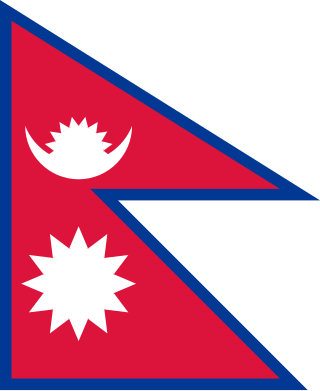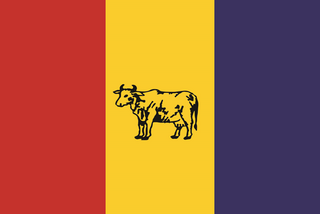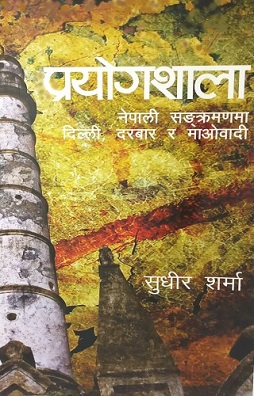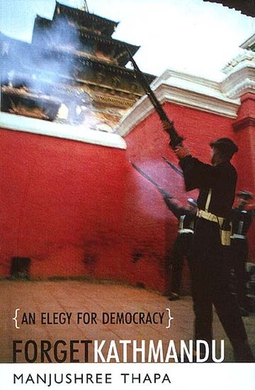
The history of Nepal is intertwined with the history of the broader Indian subcontinent and the surrounding regions, comprising the areas of South Asia and East Asia.

The politics of Nepal functions within the framework of a parliamentary republic with a multi-party system. Executive power is exercised by the Prime Minister and their cabinet, while legislative power is vested in the Parliament.

Nepal, officially the Federal Democratic Republic of Nepal, is a landlocked country in South Asia. It is mainly situated in the Himalayas, but also includes parts of the Indo-Gangetic Plain. It borders the Tibet Autonomous Region of China to the north, and India in the south, east, and west, while it is narrowly separated from Bangladesh by the Siliguri Corridor, and from Bhutan by the Indian state of Sikkim. Nepal has a diverse geography, including fertile plains, subalpine forested hills, and eight of the world's ten tallest mountains, including Mount Everest, the highest point on Earth. Kathmandu is the nation's capital and the largest city. Nepal is a multi-ethnic, multi-lingual, multi-religious and multi-cultural state, with Nepali as the official language.

Birendra Bir Bikram Shah Dev was the tenth Shah Ruler and the King of Nepal from 1972 until his assassination in 2001. He was the eldest son of King Mahendra.

The Nepalese Civil War was a protracted armed conflict that took place in the former Kingdom of Nepal from 1996 to 2006. It saw countrywide fighting between the Nepalese royal government and the Communist Party of Nepal (Maoist), with the latter making significant use of guerrilla warfare. The conflict began on 13 February 1996, when the CPN (Maoist) initiated an insurgency with the stated purpose of overthrowing the Nepalese monarchy and establishing a people's republic; it ended with the signing of the Comprehensive Peace Accord on 21 November 2006.

Pushpa Kamal Dahal, alias Prachanda, is a Nepalese politician currently serving as the Prime Minister of Nepal. He previously held the prime ministerial post from 2008 to 2009 as the first prime minister of the Federal Democratic Republic of Nepal, and again from 2016 to 2017.

Baburam Bhattarai, also known by his nom de guerre Laaldhwoj, is a Nepalese politician and former Prime Minister, who presently serves as leader of the Nepal Socialist Party.

The Communist Party of Nepal (Maoist Centre) (Nepali: नेपाल कम्युनिस्ट पार्टी (माओवादी केन्द्र)), abbreviated CPN (Maoist Centre), CPN-Maoist Centre, CPN Maoist Centre, or CPN (MC), is the third largest political party in Nepal and a member party of Socialist Front. It was founded in 1994 after breaking away from the Communist Party of Nepal (Unity Centre). The party launched an armed struggle in 1996 against the Nepalese government. In 2006, the party formally joined mainstream politics after signing a peace agreement following the 2006 Nepalese revolution.

The Communist Party of Nepal (Unified Marxist–Leninist) (Nepali: नेपाल कम्युनिष्ट पार्टी (एकीकृत मार्क्सवादी-लेनिनवादी); abbr. CPN (UML)) is a communist political party in Nepal. The party emerged as a major party in Nepal after the end of the Panchayat era.

Sher Bahadur Deuba is a Nepali politician and former prime minister of Nepal. He has also been serving as the president of the Nepali Congress since 2016. Deuba has served five terms as prime minister and is the Member of Parliament for the parliamentary constituency of Dadeldhura 1.

The Rastriya Prajatantra Party is a constitutional monarchist and Hindu nationalist political party in Nepal.

Bhutan–Nepal relations refer to the bilateral relations between the Bhutan and Nepal. Relations were formally established in 1983. The two Himalayan countries are both landlocked, separated only by the Indian State of Sikkim. Both countries are bordered by India and the People's Republic of China. However, the current state of relations remains strained owing to the Bhutanese refugee crisis.

Chandra Kishor Lal, popularly known as C. K. Lal is a Nepalese journalist, political columnist, and engineer. He is mostly known for his columns in daily newspapers in Nepal and India, his frequent participation in academic circles, and his 2010 play Sapanako Sabiti, which premiered in Gurukul. His book Human Rights, Democracy and Governance was published in early 2010 by Pearson, New Delhi. He is also known for his book To Be A Nepalese, published in 2012 by Martin Chautari, Kathmandu. The book was originally published as Nepaliya Hunalai. He is also co-editor of the volume Chapama Dalit published by Ekta Books, Kathmandu (2001).

Khadga Prasad Sharma Oli is a Nepalese politician, former Prime Minister of Nepal and the current leader of the Opposition. He has served three terms as prime minister, from 11 October 2015 to 3 August 2016, from 15 February 2018 to 13 May 2021 as the first prime minister to be appointed following the first general election under the new constitution, and from 13 May 2021 to 13 July 2021.

Prayogshala is a book about the politics of Nepal. It was written by Sudheer Sharma. The book revolves around the Maoist insurgency, deposed monarchy and the role of New Delhi in Nepal's period of political transition. It was published by Fine Print. The book was translated and updated as The Nepal Nexus and published on 2019.

Karna Shakya is a Nepalese environmentalist, conservationist, hotel entrepreneur, writer and philanthropist. Shakya is a forester by academic qualification. He served as a wildlife officer and pioneered in establishing the first National Park in Nepal. He resigned from his government job, entered the tourism business in 1970, and now owns a chain of eco-friendly hotels in major touristic cities like Kathmandu, Pokhara, chitwan and Lumbini.

Communism in Nepal traces its roots back to the pro-democracy movement of 1951, and the subsequent overthrow of the autocratic Rana regime and the establishment of democracy in Nepal. The communist movement in Nepal has split into factions multiple times and multiple factions have come together into a single fold at times as well. It has a history of getting banned from open political discourse, as well as multiple instances of embracing guerrilla insurgency, most notably, the Maoist insurgency in the 1990s and early 2000s that led to the Nepalese Civil War, claiming at least 17,000 lives.

Hisila: from Revolutionary to First Lady is a 2021 memoir by Nepalese politician Hisila Yami. It was published by Penguin Random House.

All Roads Lead North: Nepal's Turn to China is a 2021 non-fiction book by journalist Amish Raj Mulmi. It was published on 15 March 2021 by Context, and published by Hurst Publishers and Oxford University Press in the UK and US respectively as All Roads Lead North: China, Nepal and the Contest for the Himalayas. It was chosen among The Guardian's 'Books that explain the world' in 2021.

Forget Kathmandu: An Elegy for Democracy is a historical book by Manjushree Thapa. The book was published in 2005 by Penguin Books. It is the third book of the writer who had previously published Mustang Bhot in Fragments in 1992 and The Tutor of History in 2001. Thapa is one of the first mainstream English writers from Nepal.




















